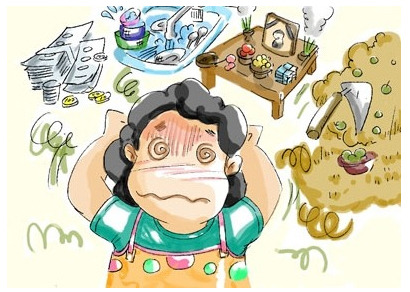
Chuseok, the Korean version of Thanksgiving, is one of the biggest national holidays in South Korea, is also one of the longest resting holidays a year. In what’s supposed to be a relaxing holiday, stress is a very prevalent part of Chuseok. These stresses are exposed through social media that write down one’s inner thoughts, and according to an announcement by Twitter Korea, the top mentioned word was joyful. However, in the top 10, ‘stress’ took third place.
On Chuseok, 56 percent of the respondents shared positive attitudes, but 34 percent showed negative attitudes. In terms of association, six out of the top 10 list were negative words such as stress, difficulty, crying, disgust, loneliness, and fatigue. “Chuseok stress is an issue online every year for the young generation, which has become difficult to prepare for ancestral rites or has become more difficult to find jobs and marry,” Twitter Korea said in a news release.
In general, the biggest stress of the nation’s Thanksgiving holidays is the constant nagging. In the Korean Society, the reason why people must keep listening despite the stress is because they are ‘older relatives’. During holidays like Chuseok, when relatives gather together, even though society changes rapidly, the nagging reaffirms that the authoritarian hierarchy of ‘age and sex’ does not change.
However, the reason for the stress varies significantly depending on whether you are married or not. The unmarried people picked ‘I don’t want to hear relative’s kids nagging’ (33.5%) as their first choice. They were also worried about spending a lot of money (19.8%), gifts (19.5%), unemployment (19.3%), and so on. In the case of married couples, they chose spending a lot of money, and gifts (35.3%). awkward and uncomfortable in-laws (14.6%), and preparation of food for ancestral rites (6.6%).
The source of stress also varied with the gender. For most housewives, the psychological burden that they feel around the time of the holiday, when household labor is most brutal, leads to high stress. In addition, the ancestral rites and its preparation including preparation of catering food are putting a lot of pressure on housewives amid soaring prices every year. For male, the financial burden and the conflict between the wife and his own family is one of the main reasons for high stress.
People are trying to relieve some of that stress, and the most common way to relieve stress during the holidays was with 221 people (26%) answering enjoying culture. Most mentioned culture was included entertainment such as movies and reading. 148 people answered they took walks alone, and 147 people answered they talked with about it. However, 24 percent of respondents, or 200, answered, “I just put up with it,” demonstrating the severity of the holiday stress. In particular, 544 people, or 65 percent, responded to the question, “Have you ever thought about traveling, working or studying on a holiday, to avoid such stress?”


